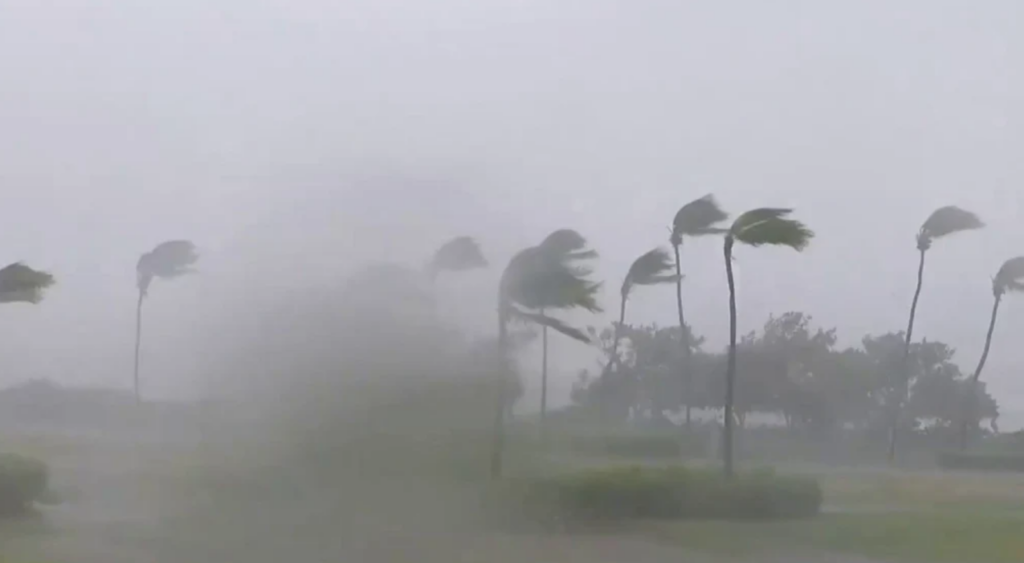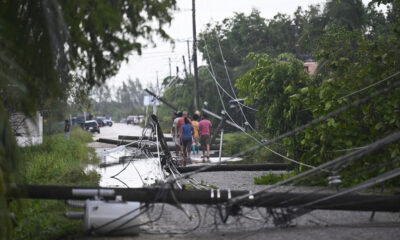International
Fiona batters Turks and Caicos as Category 3 hurricane

AFP
Hurricane Fiona battered the Turks and Caicos islands as a powerful Category 3 storm on Tuesday after leaving a trail of destruction in Puerto Rico and the Dominican Republic.
The top US disaster management official was headed to Puerto Rico meanwhile to assess the damage in the US territory still struggling to recover from Hurricane Maria five years ago.
Fiona has left at least two people dead as it churned across the Caribbean — a man whose home was swept away in the French overseas department of Guadeloupe and another in the Dominican Republic who died while cutting down a tree.
The Turks and Caicos, a British territory of some 38,000 people, was being lashed by heavy rains and strong winds as Fiona crept northwards on a path that could see the storm approaching Bermuda late Thursday.
“Hurricane Fiona has proven to be an unpredictable storm,” Anya Williams, the deputy governor of the Turks and Caicos, said in a broadcast.
Williams said no casualties or serious injuries had been reported in the Turks and Caicos overnight but she urged residents to continue to shelter in place.
Blackouts were reported on Grand Turk and several other islands in the archipelago and 165 people were admitted to shelters, she said, adding that Britain’s Royal Navy and the US Coast Guard are standing by provide assistance.
The US National Hurricane Center (NHC) said Fiona was packing maximum winds nearing 115 miles (185 kilometers) per hour, making it a major hurricane, and it is expected to become even stronger.
Dominican Republic President Luis Abinader has declared three eastern provinces to be disaster zones: La Altagracia — home to the popular resort of Punta Cana — El Seibo and Hato Mayor.
Several roads were flooded or cut off by falling trees or electric poles around Punta Cana where the power was knocked out.
Footage from local media showed residents of the east coast town of Higuey waist-deep in water trying to salvage personal belongings.
“It came through at high speed,” Vicente Lopez told AFP, bemoaning the destroyed businesses in the area.
‘I have food and water’
US President Joe Biden has declared a state of emergency in Puerto Rico — where the storm hit a day earlier — and dispatched the head of the Federal Emergency Management Agency to the island.
“We’re sending hundreds of additional staff in the next few days to place staff in each of the impacted communities,” FEMA Administrator Deanne Criswell said.
Puerto Rico Governor Pedro Pierluisi said the storm had caused catastrophic damage on the island of three million people since Sunday, with some areas receiving more than 30 inches (76 centimeters) of rain.
Michelle Carlo, medical advisor for Direct Relief in Puerto Rico, told CBS News that “a lot of people in Puerto Rico are suffering right now.”
“About 80 percent of Puerto Ricans are still without power and about 65 percent are without water service,” Carlo said.
Across Puerto Rico, Fiona caused landslides, blocked roads and toppled trees, power lines and bridges, Pierluisi said.
A man was killed as an indirect result of the power blackout — burned to death while trying to fill his generator, according to authorities.
On Monday afternoon, Nelly Marrero made her way back to her home in Toa Baja, in the north of Puerto Rico, to clear out the mud that surged inside after she evacuated.
“Thanks to God, I have food and water,” Marrero — who lost everything when Hurricane Maria devastated Puerto Rico — told AFP by telephone.
The hurricane has left around 800,000 people without drinking water as a result of power outages and flooded rivers, officials said.
After years of financial woes and recession, Puerto Rico in 2017 declared the largest bankruptcy ever by a local US administration.
Later that year, the double hit from hurricanes Irma and Maria added to the misery, devastating the electrical grid on the island — which has suffered from major infrastructure problems for years.
The grid was privatized in June 2021 in an effort to resolve the problem of blackouts, but the issue has persisted, and the entire island lost power earlier this year.
International
Trump Floats “Friendly Takeover” of Cuba Amid Rising Tensions

U.S. President Donald Trump said Friday that his administration is considering what he described as a “friendly takeover” of Cuba, as Washington continues to increase pressure on the island’s communist government.
“The Cuban government is talking to us and they have very serious problems, as you know. They have no money, they have nothing at this moment, but they are talking to us and maybe we will see a friendly takeover of Cuba,” Trump told reporters as he departed the White House for a trip to Texas.
Earlier in the week, U.S. Secretary of State Marco Rubio said Cuba needed a “radical change,” shortly after Washington eased restrictions on oil exports to the island for what officials described as “humanitarian reasons,” amid a deep economic crisis.
The United States has imposed an energy blockade on Cuba since January, citing what it calls an “extraordinary threat” posed by the communist-run island, located roughly 150 kilometers (90 miles) off the coast of Florida, to U.S. national security.
International
Argentina’s Senate Reviews Milei-Backed Labor Overhaul

Argentina’s Senate on Friday began reviewing the Labor Modernization Law promoted by the administration of President Javier Milei, a proposal that would significantly reshape labor rules across the country.
The upper chamber opened its final discussion of the contentious initiative, which revises the method used to calculate severance payments — lowering the amounts owed in dismissal cases — and introduces an “hour bank” mechanism that allows overtime to be offset with paid leave rather than extra wages.
The legislation also broadens the classification of essential services, a change that would place new limits on the right to strike in designated sectors.
The bill was initially approved by the Senate on February 11 and then moved to the Chamber of Deputies, where lawmakers passed it with amendments. It has now returned to the Senate for definitive approval.
Outside the Congress building in Buenos Aires, workers, trade unions and left-wing organizations staged demonstrations beginning at midday. The gathering later thinned out amid reports of disturbances and a strong police presence. Security forces had secured the area surrounding the legislature since early morning hours.
Union leaders contend that the reform weakens labor protections, while many business representatives back the measure but stress that sustainable formal employment will require economic expansion, improved credit conditions, greater investment and a more dynamic domestic market.
International
Federal Judge Blocks Trump Policy Allowing Deportations to Third Countries

A federal judge ruled on Wednesday that the policy of U.S. President Donald Trump’s administration allowing immigration authorities to deport foreign nationals to third countries without prior notice or the opportunity to object is unlawful. The decision marks another legal setback for the administration on immigration matters.
Judge Brian Murphy of the U.S. District Court for the District of Massachusetts struck down the regulation issued last year, which stated that Immigration and Customs Enforcement (ICE) was not required to notify migrants if they were to be sent to countries other than the one listed in their removal order, provided that receiving nations offered assurances they would not face persecution or torture.
Murphy ordered the measure vacated but granted a 15-day delay before the ruling takes effect, giving the Trump administration time to file an appeal.
In his decision, the judge concluded that the policy violates federal immigration law and migrants’ due process rights. He also questioned the lack of transparency surrounding the alleged assurances provided by receiving countries, stating that “no one really knows anything about these supposed ‘assurances.’” He added, “It is not right, and it is not lawful.”
The ruling follows several legal disputes involving deportations to third countries. Last year, the executive branch deported more than 200 Salvadorans to a maximum-security prison in El Salvador, invoking an old wartime law. The White House also held talks with Costa Rica, Panama, and Rwanda about receiving migrants who are not citizens of those countries.
In May, the same judge determined that the government violated a court order when it attempted to remove a group of immigrants with criminal records to South Sudan without prior notice or an opportunity to raise claims of fear of persecution.
Although President Donald Trump took the case to the U.S. Supreme Court, which temporarily allowed the deportations to resume while a final decision was pending, the White House is expected to again appeal to higher courts to overturn this latest judicial ruling.
-

 International3 days ago
International3 days agoFamily of “El Mencho” Seeks Return of Body After Deadly Military Operation
-

 International3 days ago
International3 days agoLarry Summers Steps Down from Harvard Role Amid Epstein Controversy
-

 International3 days ago
International3 days agoIran’s President Optimistic Ahead of Geneva Nuclear Talks with U.S.
-

 International3 days ago
International3 days agoBill Gates Admits “Serious Mistake” Over Epstein Ties
-

 International3 days ago
International3 days agoStephen Hawking Photo Appears in Newly Released Epstein Documents
-

 International5 days ago
International5 days agoOver 40 Million Affected by Major Snowstorm in Northeastern U.S.
-

 International1 day ago
International1 day agoCocaine Production Surges 34% in 2023 as Market Expands into Africa and Asia
-

 International5 days ago
International5 days agoNine People Killed in Two Armed Attacks in Manabí, Ecuador
-

 International1 day ago
International1 day agoFederal Judge Blocks Trump Policy Allowing Deportations to Third Countries
-

 International1 day ago
International1 day agoClinton Accuses Republican Committee of Using Epstein Case to Shield Trump
-

 International9 hours ago
International9 hours agoArgentina’s Senate Reviews Milei-Backed Labor Overhaul
-

 International9 hours ago
International9 hours agoTrump Floats “Friendly Takeover” of Cuba Amid Rising Tensions






























